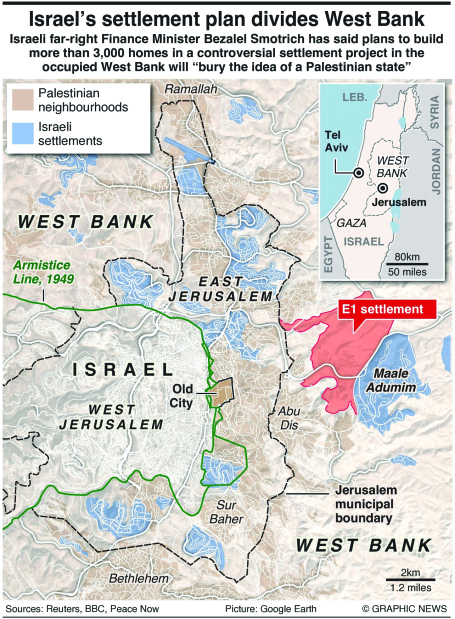The UN human rights office said yesterday that at least 1,760 Palestinians had been killed while seeking aid in Gaza since late May, a jump of several hundred since its last published figure at the beginning of August.
“Since May 27, and as of August 13, we have recorded that at least 1,760 Palestinians have been killed while seeking aid; 994 in the vicinity of GHF (Gaza Humanitarian Foundation) sites and 766 along the routes of supply convoys. Most of these killings were committed by the Israeli military,” the agency’s office for the Palestinian territories said.
That compares with a figure of 1,373 deaths, which the office reported on August 1.
The UN human rights office also said an Israeli plan to build thousands of new homes between an Israeli settlement in the West Bank and near East Jerusalem was illegal under international law, and would put nearby Palestinians at risk of forced eviction, which it described as a war crime.
Israeli far-right Finance Minister Bezalel Smotrich on Thursday vowed to press on a long-delayed settlement project, saying the move would ‘bury’ the idea of a Palestinian state.
The UN rights office spokesperson said the plan would break the West Bank into isolated enclaves and that it was ‘a war crime for an occupying power to transfer its own civilian population into the territory it occupies’.
About 700,000 Israeli settlers live among 2.7 million Palestinians in the West Bank and East Jerusalem. Israel annexed East Jerusalem in 1980, a move not recognised by most countries, but has not formally extended sovereignty over the West Bank.
Most world powers say settlement expansion erodes the viability of a two-state solution by breaking up territory the Palestinians seek as part of a future independent state.
The two-state plan envisages a Palestinian state in East Jerusalem, the West Bank and Gaza, existing side by side with Israel, which captured all three territories in the 1967 Middle East war.
Israel cites historical and biblical ties to the area and says the settlements provide strategic depth and security and that the West Bank is ‘disputed’ not ‘occupied’.
Meanwhile, South Sudan and Israel are discussing a deal to resettle Palestinians from war-torn Gaza in the troubled African nation, three sources told Reuters – a plan quickly dismissed as unacceptable by Palestinian leaders.
The sources, who have knowledge of the matter but spoke on condition of anonymity, said no agreement had been reached but talks between South Sudan and Israel were ongoing.
The plan, if carried further, would envisage people moving from an enclave shattered by almost two years of war with Israel to a nation in the heart of Africa riven by years of political and ethnically-driven violence.
Israeli Prime Minister Benjamin Netanyahu said this month he intends to extend military control in Gaza, and this week repeated suggestions that Palestinians should leave the territory voluntarily.
Arab and world leaders have rejected the idea of moving Gaza’s population to any country. Palestinians say that would be like another ‘Nakba’ (catastrophe) when hundreds of thousands fled or were forced out during the Arab-Israeli war of 1948.
The three sources said the prospect of resettling Palestinians in South Sudan was raised during meetings between Israeli officials and South Sudanese Foreign Minister Semaya Kumba when he visited the country last month.
Their account appeared to contradict South Sudan’s foreign ministry which on Wednesday dismissed earlier reports on the plan as ‘baseless’.
The ministry was not immediately available to respond to the sources’ assertions yesterday.
News of the discussions was first reported on Tuesday, citing six people with knowledge of the matter.
Wasel Abu Youssef, a member of the Executive Committee of the Palestine Liberation Organisation, said the Palestinian leadership and people ‘reject any plan or idea to displace any of our people to South Sudan or to any other place’.
His statement echoed a statement from the office of Palestinian President Mahmoud Abbas on Thursday. Hamas, which is fighting Israel in Gaza, did not immediately respond to requests for comment.
Israeli Deputy Foreign Minister Sharren Haskel, who visited the South Sudanese capital Juba this week, told Reuters that those discussions had not focused on relocation.
“This is not what the discussions were about,” she said when asked if any such plan had been discussed.



&uuid=(email))